Unit13We27retryingtosavetheearth知识点整理
新人教版九年级英语下册Unit 13 We’re trying to save the earth!要点详解
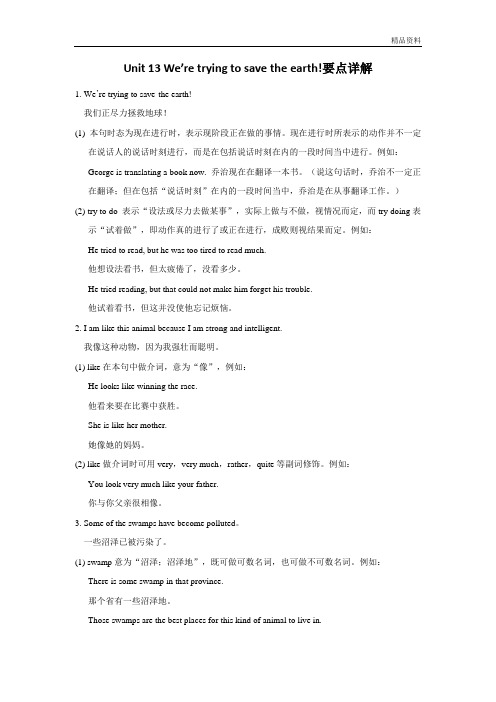
Unit 13 We’re trying to save the earth!要点详解1. We’re trying to save the earth!我们正尽力拯救地球!(1) 本句时态为现在进行时,表示现阶段正在做的事情。
现在进行时所表示的动作并不一定在说话人的说话时刻进行,而是在包括说话时刻在内的一段时间当中进行。
例如:George is translating a book now. 乔治现在在翻译一本书。
(说这句话时,乔治不一定正在翻译;但在包括“说话时刻”在内的一段时间当中,乔治是在从事翻译工作。
)(2) try to do 表示“设法或尽力去做某事”,实际上做与不做,视情况而定,而try doing表示“试着做”,即动作真的进行了或正在进行,成败则视结果而定。
例如:He tried to read, but he was too tired to read much.他想设法看书,但太疲倦了,没看多少。
He tried reading, but that could not make him forget his trouble.他试着看书,但这并没使他忘记烦恼。
2. I am like this animal because I am strong and intelligent.我像这种动物,因为我强壮而聪明。
(1) like在本句中做介词,意为“像”,例如:He looks like winning the race.他看来要在比赛中获胜。
She is like her mother.她像她的妈妈。
(2) like做介词时可用very,very much,rather,quite等副词修饰。
例如:You look very much like your father.你与你父亲很相像。
3. Some of the swamps have become polluted。
一些沼泽已被污染了。
人教版 九年级unit13 We are trying to save the earth知识点详解

Unit 13 We are trying to save the earth.知识点详解单元目标总览:1.noise pollution噪音污染(1)noise此处作为名词,意为噪音。
make noises或make a noise意为制造噪音。
◆If you make noises at night,my dog will bark.如果你在晚上发出吵闹声,我的狗会叫。
(2)pollution不可数名词,“污染,污染物”,其动词形式是pollute。
◆The river has been polluted by wastewater from the factory.这条河流已经收到工厂废水的污染。
2. The air has become really polluted around here. 这儿的空气已经被污染了。
辨析:turn, get 与become①become多指身份、职位等的变化,它强调变化的过程已经完成,后面可接名词或形容词。
◆He becomes a teacher. 他成了一名老师。
② get多用于口语,表示一种变化过程,强调的是“渐渐变得”,后常接形容词的比较级形式。
◆In winter the days get shorter. 冬季白天变得较短。
③ turn指在颜色和性质等方面与以前的完全不同,强调变化的结果。
◆Leaves turned brown in the mountains. 山里的树叶已变成了棕色。
3. To cut down air pollution, we should take the bus or subway instead of driving. 为了减少空气污染,我们应该乘坐公共汽车或者地铁,而不是开车。
cut down 意为“减少”;是“动词+副词”结构的短语,所带的宾语为名词时,宾语可位于down的前面或后面;为代词时,只能位于down前面。
新版人教新目标版2020年九年级英语全册Unit13We’retryingtosavetheearth!基础知识梳理

Unit 13 We're trying to save the earth!Unit 13We're trying to save the earth!第1课时Section A(1a2d)litter v. 乱扔。
相当于throw。
n. 垃圾;废弃物。
不可数名词,相当于rubbishugly adj. 丑陋的;难看的advantage n.优点;有利条件。
其反义词为disadvantage。
常用短语:take advantage of…利用……的优势cost v. 花费。
其过去式和过去分词均为cost n. 花费;价钱【拓展】 cost, spend, take和pay用法辨析(1)cost 花费(时间、精力、金钱等)。
主语只能是物或事情。
cost 可以带双宾语,但cost没有被动语态。
(2)spend 花(时间、钱等)。
主语只能是人,指某人“花费(时间、钱等)”,常用于spend…on sth.或spend…(in) doing sth. 句型中。
(3)take指花费时间和金钱时,常用于It take(s) sb.…time/money to do sth.句型中。
(4)pay 付费。
主语只能是人,指某人为某东西付钱,常用于sb. pay money for sth.句型中。
play a part in 参与;起作用。
其中in为介词,后接名词、代词或动词ing形式turn…into 变成make a difference 影响;有作用☆To cut down air pollution, we should take the bus or subw ay instead of driving. 为了减少空气污染,我们应该乘坐公共汽车或者地铁,而不是开车。
(1)句中动词不定式短语to cut down air pollution在句中作目的状语。
(2)cut down 减少;砍倒。
2023九年级英语全册Unit13We'retryingtosavetheearth单元语法知识梳理

一、现在进行时现在进行时表示现在或现阶段正在发生或进行的动作。
常见的标志词有now, at the moment(此刻),look, listen等。
其构成为“am / is/ are+动词ing形式”。
例句:Don't make loud noise. The children are having an English lesson. 不要弄出这么大响声,孩子们正在上英语课。
Listen! She is singing an English song. 听!她正在唱英文歌。
一些表示位置移动的动词,如go, e, leave, arrive等,常用现在进行时表示将来。
例句:He is leaving for Shanghai tomorrow. 明天他将前往上海。
下列动词通常不用于现在进行时:1.表示感觉、情感、心理活动的动词,如see, hear, smell, taste, notice, seem, hate, like, love, want, wish等。
2.表示所有或占有关系的动词,如have, own, belong等。
3.表示记忆、理解、相信、知道或决定的动词,如forget, remember, understand, believe, know, decide等。
二、现在完成时现在完成时表示过去发生的动作对现在产生的影响或结果。
其结构为“have / has +过去分词”。
用法示例表示到现在为止已经发生的动作或状态,句中常用already, just或yet。
They have already cleaned the classroom. 他们已经打扫了教室。
表示到现在为止曾经或从来没有发生过的动作或状态,句中常用ever或never。
I have ever been to that country. 我曾去过那个国家。
表示到目前为止某一动作已经发生了若干次,句中常用once, twice, …times等。
Unit-13-We're-trying-to-save-the-earth!重难点全解
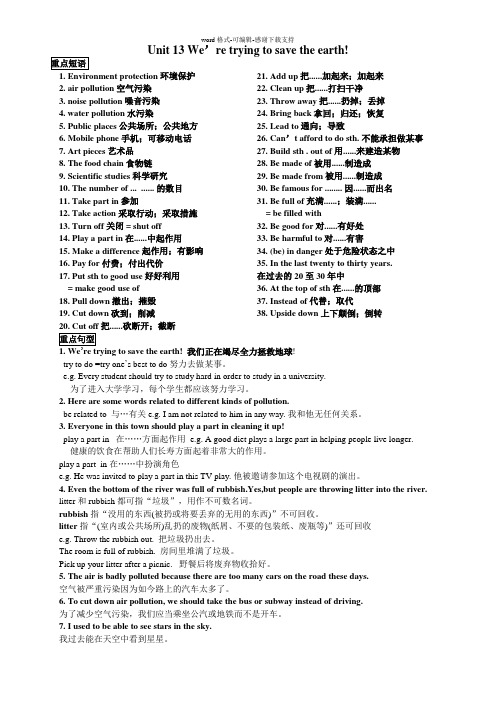
word格式-可编辑-感谢下载支持Unit 13 We’re trying to save the earth!1. Environment protection 环境保护2. air pollution 空气污染3. noise pollution 噪音污染4. water pollution 水污染5. Public places 公共场所;公共地方6. Mobile phone 手机;可移动电话7. Art pieces 艺术品8. The food chain 食物链9. Scientific studies 科学研究10. The number of ... ...... 的数目11. Take part in 参加12. Take action 采取行动;采取措施13. Turn off关闭 = shut off14. Play a part in 在......中起作用15. Make a difference 起作用;有影响16. Pay for 付费;付出代价17. Put sth to good use 好好利用= make good use of18. Pull down 撤出;摧毁19. Cut down 砍到;削减20. Cut off 把......砍断开;截断21. Add up 把......加起来;加起来22. Clean up 把......打扫干净23. Throw away 把......扔掉;丢掉24. Bring back 拿回;归还;恢复25. Lead to 通向;导致26. Can’t afford to do sth. 不能承担做某事27. Build sth . out of 用......来建造某物28. Be made of 被用......制造成29. Be made from 被用......制造成30. Be famous for ........ 因......而出名31. Be full of 充满......;装满......= be filled with32. Be good for 对......有好处33. Be harmful to 对......有害34. (be) in danger 处于危险状态之中35. In the last twenty to thirty years.在过去的20至30年中36. At the top of sth 在......的顶部37. Instead of 代替;取代38. Upside down 上下颠倒;倒转1. We’re trying to save the earth! 我们正在竭尽全力拯救地球!try to do =try one’s best to do 努力去做某事。
Unit 13 We're trying to save the earth! 重难点知识归纳总结
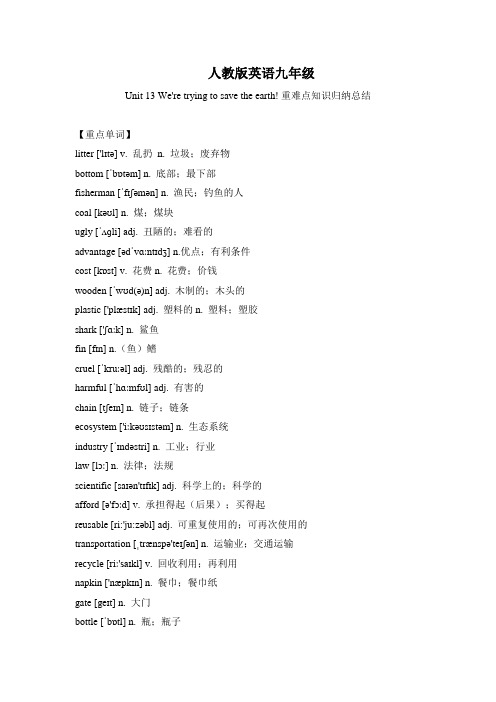
人教版英语九年级Unit 13 We're trying to save the earth! 重难点知识归纳总结【重点单词】litter ['lɪtə] v. 乱扔n. 垃圾;废弃物bottom [ˈbɒtəm] n. 底部;最下部fisherman [ˈfɪʃəmən] n. 渔民;钓鱼的人coal [kəʊl] n. 煤;煤块ugly [ˈʌɡli] adj. 丑陋的;难看的advantage [ədˈvɑːntɪdʒ] n.优点;有利条件cost [kɒst] v. 花费n. 花费;价钱wooden [ˈwʊd(ə)n] adj. 木制的;木头的plastic ['plæstɪk] adj. 塑料的n. 塑料;塑胶shark ['ʃɑːk] n. 鲨鱼fin [fɪn] n.(鱼)鳍cruel [ˈkruːəl] adj. 残酷的;残忍的harmful [ˈhɑːmfʊl] adj. 有害的chain [tʃeɪn] n. 链子;链条ecosystem ['iːkəʊsɪstəm] n. 生态系统industry [ˈɪndəstri] n. 工业;行业law [lɔː] n. 法律;法规scientific [saɪən'tɪfɪk] adj. 科学上的;科学的afford [ə'fɔːd] v. 承担得起(后果);买得起reusable [ri:'ju:zəbl] adj. 可重复使用的;可再次使用的transportation [ˌtrænspə'teɪʃən] n. 运输业;交通运输recycle [riː'saɪkl] v. 回收利用;再利用napkin ['næpkɪn] n. 餐巾;餐巾纸gate [geɪt] n. 大门bottle [ˈbɒtl] n. 瓶;瓶子president [ˈprezɪdənt] n. 负责人;主席;总统inspiration [ˌɪnspə'reɪʃən] n. 灵感;鼓舞人心的人(或事物)iron ['aɪən] n. 铁work [wɜːk] n. (音乐、艺术)作品metal ['metl] n. 金属creativity [ˌkriːeɪ'tɪvɪtɪ] n. 创造力;独创性【重点短语】1. at the bottom of the river 在河底2. be full of rubbish 充满垃圾3. throw litter into the river 把垃圾扔入河中4. play a part in cleaning it up 尽一份力把它清理干净5. land pollution 土地污染6. fill the air with black smoke 使空气中充满了黑烟7. cut down air pollution 减少空气污染8. make a difference 产生影响9. take action 采取行动10. turn off 关掉11. pay for 付费12. add up 累加13. use public transportation 使用公共交通14. recycle books and paper 回收书和纸15. use paper napkins 使用纸巾16. turn off the shower 关掉淋浴器17. ride in cars 开车出行18. cut off 割掉;砍掉19. upside down 颠倒;倒转【重点句型】1.Even the bottom of the river was full of rubbish.甚至河底都充满了垃圾。
Unit 13 We are trying to save the earth知识点总结

Unit 13 We are trying to save the earth!一.教材知识详解Section A1.The air has become really polluted around here.(1)现在完成时(复习)(2)become2.Well, cut down air pollution, we should take the bus or subway instead of driving.(1)cut down(2)instead of 与instead3.There are other advantages of bike riding. It’s good for health and it doesn’t cost anything!考点:advantage4.And remember to throw rubbish in the bins and keep public places clean and beautiful for everyone.(1)remember to do remember doing(2)系动词keep(3)everyone与every one5.Many have heard of shark fin soup.hear of 听说hear短语归纳:6.When people catch sharks, they cut off their fins and throw the shark back into the ocean.cut off 连接名词或代词时,名词或代词应放在_________________________cut短语归纳:off短语归纳:7.This method is not only cruel, but also harmful to the environment.(1)cruel(2)not only...but also(3)be harmful to8.So far, no scientific studies have shown that shark fins are good for health, so why eat them?考点:so far9.Many believe that sharks can never be endangered because they are the strongest in their food chain.(1)the strongest(2)Endanger10.afford /spend/take/cost/paySection B1.Do you often throw away things you don’t need anymore?考点:throw away2.Have you ever thought about how these things can actually be put to good use?(1)think about(2)put ...to good use*put 其他短语:3.She lives in a house in the UK that she built herself out of rubbish.(1)built...out of sth(2)定语从句复习4.The windows and doors come from old buildings around her town that were pulled down.考点:pull down*pull其他短语:5.She opened a small shop where she sells her bags, and she has also set up a website to sell them on line.(1)This is the city where I was born.(2)set up*set相关短语:6.Not only can the art bring happiness to others, but it also shows that even cold, hard iron can be brought back to life with a little creativity.(1)not only...but also...(2)bring...back to life(3)others二.语法复习1.现在进行时ed to3.被动语态4.现在完成时5.情态动词【基础训练】【能力提升】。
部编版初中英语九年级Unit13We'retryingtosavetheearth!必背
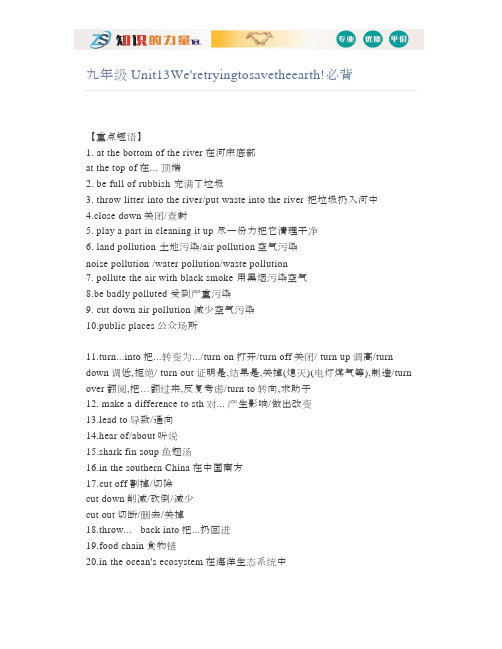
九年级Unit13We'retryingtosavetheearth!必背【重点短语】1. at the bottom of the river在河床底部at the top of在... 顶端2. be full of rubbish 充满了垃圾3. throw litter into the river/put waste into the river 把垃圾扔入河中4.close down关闭/查封5. play a part in cleaning it up 尽一份力把它清理干净6. land pollution 土地污染/air pollution空气污染noise pollution /water pollution/waste pollution7. pollute the air with black smoke 用黑烟污染空气8.be badly polluted 受到严重污染9. cut down air pollution 减少空气污染10.public places公众场所11.turn...into把...转变为.../turn on打开/turn off关闭/ turn up调高/turn down调低,拒绝/ turn out证明是,结果是,关掉(熄灭)(电灯煤气等),制造/turn over翻阅,把…翻过来,反复考虑/turn to转向,求助于12. make a difference to sth对... 产生影响/做出改变13.lead to导致/通向14.hear of/about听说15.shark fin soup鱼翅汤16.in the southern China在中国南方17.cut off割掉/切除cut down削减/砍倒/减少cut out切断/删去/关掉18.throw... back into把...扔回进19.food chain食物链20.in the ocean's ecosystem在海洋生态系统中21.be endangered濒临灭绝22.in this industry在这个行业23.the number of...,... 的数量a number of...,大量的...24.fall/drop by 下降了fall/drop to下降到25.in the last 20 to 30 years在过去的二三十年里26.environmental protection groups环保组织27.teach the public about finning教导公众有关割鳍28.develop laws完善法律29.scientific studies科学研究30. improve the environment改善环境31.take action to do sth.采取行动去做……32.can't afford to wait等不起33.begin with从...开始34.save electricity省电35.turn off the lights关灯36.reusable bags可重复使用的袋子/环保袋37. pay for 付费38. add up累加/合计39.do...instead of doing...做...而不是做...40.stop riding in cars不要开车出行41. use public transportation 使用公共交通42. recycle books and paper 回收书和废纸43. use paper napkins 使用纸巾44. turn off the shower 关掉淋浴/喷头45. rethink, reuse, recycle反思,回收,再利用46.think about考虑47.put...to good use把…很好地利用/充分利用...48.have a creative mind有创造性的思维49.build herself out of rubbish用垃圾建造自己的房子50.pull down拆毁51.turn...upside down把…上下颠倒/倒置52.win a prize获奖53.help save our planet society帮助拯救我们地球社会54.be an inspiration to us all鼓舞了我们所有人55.set up a website建立网站56.art pieces艺术品57. bring back to life使复生/复活58.with a little creativity用一点点创造力【重点句型】1. Even the bottom of the river was full of rubbish. 甚至河底都充满垃圾。
专题15.1Unit13We’retryingtosavetheearth.知识点(学生版)

Unit13 We’re trying to save the earth.27. 因…而闻名28. 看起来像29. 恢复,使想起,归还30. 在海洋生态系统重点句型 1. ________________________, we should take the bus or subway instead of driving.为了减少空气污染,我们应该乘公共汽车或地铁代替开车。
2. _____ doesn’t _______ anything. 它不耗费任何东西。
3. This is _________cruel, _________harmful to the environment. 这不但残忍,而且对环境有害。
4. __________________the biggest cleanup project this city has ever had. 它被认为是这个城市曾经有过的最大的清洁工程。
5. ________________ is really easy.回收再利用纸很容易。
6. But _____ hard ____ stop riding in cars.但是停止开小汽车是很难的。
7. Amy isn’t the only one _____is good at recycling.埃米并不是唯一一个善于回收利用的人。
8. She ________________this for a few years now.她做这事距今已经有好几年了。
9. _________can the art bring happiness to others, _____it______shows that even cold, hard ironcan be brought back to life with a little creativity.艺术不仅能带给别人快乐,而且也说明了只需要一点创造力,即使是冰冷、坚硬的铁也可以产生活力。
九年级英语全册Unit13We’retryingtosavetheearth知识点汇总新版人教新目标

Unit 13 We are trying to save the earth! Section A1.play a part in参与+n./pron./vingeg:I want to play a part in saving the earth.2.cut down减少动副短语cut短语cut in 插嘴cut off 切断cut up 切碎cut out 删除3.advantage优点可数名词have the advantage of有……的有利条件be to... advantage对……有利4.make a difference起作用;有影响make a difference (to...)(对……)产生影响或作用5.not only...but also...不但……而且……连接两个对等的成分,also 可以省略eg: I not only play tennis but (also) practise shootingeg: Not only Mr. Li but (also)his son loves the movie.连接两个主语时,就近原则eg:Not only does Miss Li like music, but (also) she likes sports 6.harmful有害的do harm to对……造成伤害eg: Smoking will do harm to your health.be harmful to对…… 有害eg: Don't read in the sun. It is harmful to your eyes7.the number of……的数量eg:The number of girls in our class is 30辨析a number of许多接可数名词复数谓语动词用复数形式the number of……的数量接可数名词复数谓语动词用单三形式8.be against...反对反:be for...支持……eg: I am not against your idea. Instead, I'm for you9.现在进行时与now, at the moment, right now, these days...连用eg:She is watching TV now.现在进行时表将来与come,go,arrive,leave,start等动词连用eg: I’m leaving tomorrow10.现在完成时构成助动词have/has+ 动词的过去分词eg: Have you ever been to Japan ?固定结构have/has been to曾经去过某地,现在已不在某地eg: I have been to the USA twice.have/has gone to去某地了,可能在途中,也可能到了那里,总之人不在说话处eg: —Where's Jim?—He has gone to the library.have/has been in在某地呆了一段时间,经常与“for+ 一段时间”连用eg: We have been in this city for three years.11.被动语态基本结构be+ 动词的过去分词eg: The glass is broken转换主动语态We visited that factory last summer.被动语态That factory was visited by us last summer.感官动词/使役动词变为被动语态时带to主动: I often hear Mary sing in the next room被动:Mary is often heard to sing in the next room Section B1.recycle回收利用eg: We recycle all of our plastic bags.2.throw away扔掉;抛弃eg: You can throw them away if you don't want these clothes.3.pull...down拆下;摧毁put短语pull together齐心协力pull off脱去pull out拔出pull in(车等)停下,进站4.win a prize赢得奖品辨析win赢,获胜后接比赛、活动、奖品beat击败;打败后接人或团队等竞争对手5.set up建立set短语set off/out动身,出发set free释放set down写下,记下6.bring back恢复;归还;带回eg: Please bring back the books to the library.7.creativityn.creator创造者,发明v.create创造adj.creative创造性的Section A1.play a part in参与+n./pron./vingeg:I want to play a part in saving the earth.2.cut down减少动副短语cut短语cut in 插嘴cut off 切断cut up 切碎cut out 删除3.advantage优点可数名词have the advantage of有……的有利条件be to... advantage对……有利4.make a difference起作用;有影响make a difference (to...)(对……)产生影响或作用5.not only...but also...不但……而且……连接两个对等的成分,also 可以省略eg: I not only play tennis but (also) practise shootingeg: Not only Mr. Li but (also)his son loves the movie.连接两个主语时,就近原则eg:Not only does Miss Li like music, but (also) she likes sports 6.harmful有害的do harm to对……造成伤害eg: Smoking will do harm to your health.be harmful to对…… 有害eg: Don't read in the sun. It is harmful to your eyes 7.the number of……的数量eg:The number of girls in our class is 30辨析a number of许多接可数名词复数谓语动词用复数形式the number of……的数量接可数名词复数谓语动词用单三形式8.be against...反对反:be for...支持……eg: I am not against your idea. Instead, I'm for you 9.现在进行时与now, at the moment, right now, these days...连用eg:She is watching TV now.现在进行时表将来与come,go,arrive,leave,start等动词连用eg: I’m leaving tomorrow10.现在完成时构成助动词have/has+ 动词的过去分词eg: Have you ever been to Japan ?固定结构have/has been to曾经去过某地,现在已不在某地eg: I have been to the USA twice.have/has gone to去某地了,可能在途中,也可能到了那里,总之人不在说话处eg: —Where's Jim?—He has gone to the library.have/has been in在某地呆了一段时间,经常与“for+ 一段时间”连用eg: We have been in this city for three years.11.被动语态基本结构be+ 动词的过去分词eg: The glass is broken转换主动语态We visited that factory last summer.被动语态That factory was visited by us last summer.感官动词/使役动词变为被动语态时带to主动: I often hear Mary sing in the next room被动:Mary is often heard to sing in the next room Section B1.recycle回收利用eg: We recycle all of our plastic bags.2.throw away扔掉;抛弃eg: You can throw them away if you don't want these clothes.3.pull...down拆下;摧毁put短语pull together齐心协力pull off脱去pull out拔出pull in(车等)停下,进站4.win a prize赢得奖品辨析win赢,获胜后接比赛、活动、奖品beat击败;打败后接人或团队等竞争对手5.set up建立set短语set off/out动身,出发set free释放set down写下,记下6.bring back恢复;归还;带回eg: Please bring back the books to the library.7.creativityn.creator创造者,发明v.create创造adj.creative创造性的附:什么样的考试心态最好大部分学生都不敢掉以轻心,因此会出现很多过度焦虑。
Unit 13 We27re trying to save the earth知识点整理
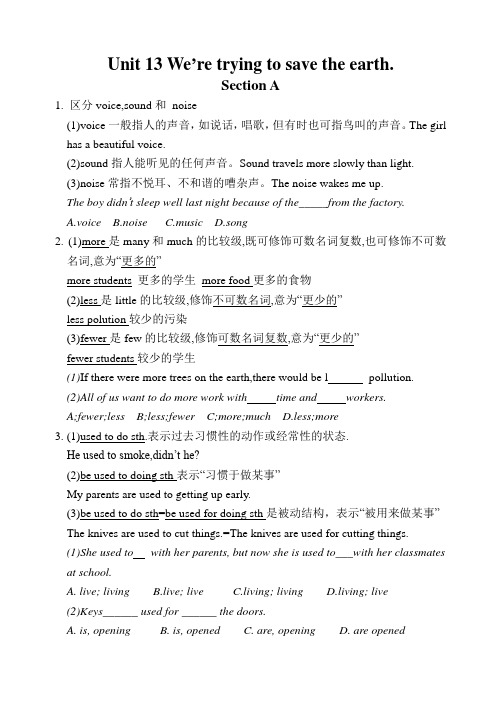
Unit 13 We’re trying to save the earth.Section A1. 区分voice,sound和noise(1)voice一般指人的声音,如说话,唱歌,但有时也可指鸟叫的声音。
The girl has a beautiful voice.(2)sound指人能听见的任何声音。
Sound travels more slowly than light.(3)noise常指不悦耳、不和谐的嘈杂声。
The noise wakes me up.The boy didn’t sleep well last night because of the_____from the factory.A.voiceB.noiseC.musicD.song2. (1)more是many和much的比较级,既可修饰可数名词复数,也可修饰不可数名词,意为“更多的”more students 更多的学生more food更多的食物(2)less是little的比较级,修饰不可数名词,意为“更少的”less polution较少的污染(3)fewer是few的比较级,修饰可数名词复数,意为“更少的”fewer students较少的学生(1)If there were more trees on the earth,there would be l pollution.(2)All of us want to do more work with time and workers.A;fewer;less B;less;fewer C;more;much D.less;more3. (1)used to do sth.表示过去习惯性的动作或经常性的状态.He used to smoke,didn’t he?(2)be used to doing sth表示“习惯于做某事”My parents are used to getting up early.(3)be used to do sth=be used for doing sth是被动结构,表示“被用来做某事”The knives are used to cut things.=The knives are used for cutting things.(1)She used to with her parents, but now she is used to___with her classmates at school.A. live; livingB.live; liveC.living; livingD.living; live(2)Keys______ used for ______ the doors.A. is, openingB. is, openedC. are, openingD. are opened4. 辨析:be able to和can(1)be able to可用于各种时态,表示经过努力而获得的能力.(2)只有现在式(can)和过去式(could).表示自身已具有的能力或有能力做某事.(1)He could play the guitar when he was five years old.(改为同义句)He play the guitar when he was five years old.(2)Work hard, and then you will ___ learn English well.A.canB.able toC.be able toD.are able to5. (1)alone表示“单独的,独自一人的”,不含感情色彩.做形容词时,只能在be 动词或系动词之后做表语,做副词时,作状语,修饰动词,相当于by oneself. He was alone in the house. I went to the movies alone,I felt lonely.(2)lonely表示“孤独的,寂寞的”含有丰富的感情色彩.lonely做形容词时,可做定语和表语。
人教新目标英语九年级全册 Unit 13 We,re trying to save the earth 单元语法知识归纳汇总
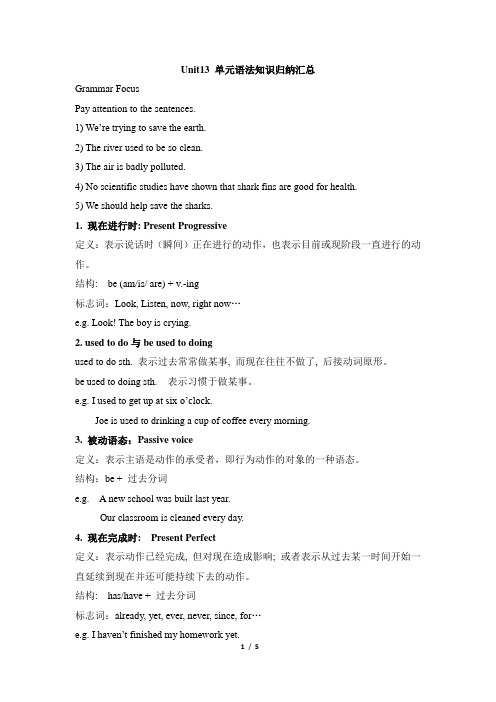
Unit13 单元语法知识归纳汇总Grammar FocusPay attention to the sentences.1) We’re trying to save the earth.2) The river used to be so clean.3) The air is badly polluted.4) No scientific studies have shown that shark fins are good for health.5) We should help save the sharks.1. 现在进行时: Present Progressive定义:表示说话时(瞬间)正在进行的动作,也表示目前或现阶段一直进行的动作。
结构: be (am/is/ are) + v.-ing标志词:Look, Listen, now, right now…e.g. Look! The boy is crying.2. used to do与be used to doingused to do sth. 表示过去常常做某事, 而现在往往不做了, 后接动词原形。
be used to doing sth. 表示习惯于做某事。
e.g. I used to get up at six o’clock.Joe is used to drinking a cup of coffee every morning.3. 被动语态:Passive voice定义:表示主语是动作的承受者,即行为动作的对象的一种语态。
结构:be + 过去分词e.g. A new school was built last year.Our classroom is cleaned every day.4. 现在完成时: Present Perfect定义:表示动作已经完成, 但对现在造成影响; 或者表示从过去某一时间开始一直延续到现在并还可能持续下去的动作。
九年级全册Unit13 We're trying to save the earth!知识点归纳

人教版初中英语九年级全册Unit13 We're trying to save theearth!知识点归纳一、重点词组与句子Section A1. throw …into …把……扔进……2. be full of 装满,充满3. close down the factories 关闭工厂4. clean up the river 清理河流5. play a part in 参与6. turn …into …= change …into…把…变成7. cut down air pollution 减少空气污染8. takeaway food 外卖食物9. public places 公共场所10. make a difference 起作用,有影响11. lead to a better future 创造一个美好的未来12. hear of 听说13. cut off 割掉14. throw…. back into …把……扔回到……15. be harmful to …对……有害16. at the top of 在…顶部或顶端17. drop too low 下降太低18. instead of doing sth. 代替做某事19. in the last 20 to 30 years 在过去的20到30年里(用于现在完成时态)20. so far 到目前为止(用于现在完成时态)21. can’t afford to do sth. 担负不起做某事22. pay for 付费;付出代价23. take part in 参加1. People are throwing litter into the river. 人们正在把垃圾扔进河里。
2. Factories are putting waste into the river. 工厂正在把废物倒进河里。
3. Everyone should help to clean up the river.人人都应该帮助清理河流。
最新九年级人教版unit13We’retryingtosavetheearth知识点详解及练习

Unit 13 We ’re trying to save the earth!一、重点短语 充满了垃圾 把垃圾扔入河中 清理干净 减少空气污染 产生影响 处于食物链的顶端 在最近的20到30年间年间 参加参加采取行动 关掉 累加 扔掉 好好利用 拆下 成为…的榜样 建立一个网站 以…而闻名 不仅…而且…二、经典句型1. Even the bottom of the river was full of rubbish. 2. Everyone in town should play a part in cleaning it up. 3. The air is badly polluted because there are too many cars on the road these days. 4. To cut down air pollution, we should take the bus or subway instead of driving. 5. I used to be able to see stars in the sky. 6. The air has become really polluted around here. I ’m getting very worried. 7. No scientific studies have shown that shark fins are good for health. 三、重点详解1. Even the bottom of the river was full of rubbish. Yes, but people are throwing litter into the river. litter 和 rubbish 都可指“垃圾”,用作不可数名词。
,用作不可数名词。
rubbish 指“没用的东西(被扔或将要丢弃的无用的东西)”不可回收。
九年级英语Unit13《We27retryingtosavetheearth》知识点
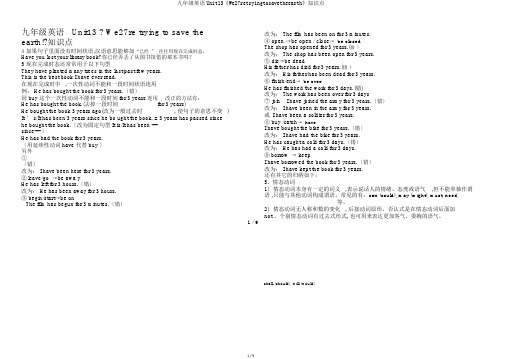
九年级英语Unit13 ? We27re trying to save the earth!?知识点4 如果句子里面没有时间状语,汉语意思能够加“已经〞,往往用现在完成时态。
Have you lost your library book?你已经弄丢了从图书馆借的那本书吗?5现在完成时态还常常用于以下句型They have planted many trees in the last/past few years.This is the best book I have ever read.在现在完成时中,一次性动词不能和一段时间状语连用例: He has bought the book for 3 years.〔错〕因 buy 这个一次性动词不能和一段时间for 3 years连用,改正的方法有:He has bought the book.(去掉一段时间for 3 years)He bought the book 3 years ago(改为一般过去时, 使句子的意思不变) It ’ s/It has been 3 years since he bo ught the book. = 3 years has passed since he bought the book.〔改为固定句型It is/It has been ---since--- 〕He has had the book for 3 years.〔用延续性动词have 代替 buy 〕另外①〔错〕改为: I have been here for 3 years.②leave/go →be awa yHe has left for 3 hours.〔错〕改为: He has been away for 3 hours.③ begin/start→be onThe film has begun for 3 minutes.〔错〕改为: The film has been on for 3 minutes.④ open →be open / close→ be closedThe shop has opened for 3 years.(错)改为: The shop has been open for 3 years.⑤ die→be deadHis father has died for 3 years.(错)改为: His father has been dead for 3 years.⑥ finish/end→ be overHe has finished the work for 3 days.(错)改为: The work has been over for 3 days⑦ join I have joined the army for 3 years.〔错〕改为: I have been in the army for 3 years.或I have been a soldier for 3 years.⑧ buy /catch→ haveI have bought the bike for 3 years.〔错〕改为: I have had the bike for 3 years.He has caught a cold for 3 days.〔错〕改为: He has had a cold for 3 days.⑨borrow → keepI have borrowed the book for 3 years.〔错〕改为: I have kept the book for 3 years.还有其它的归纳如下:5.情态动词1)情态动词本身有一定的词义 ,表示说话人的情绪、态度或语气 ,但不能单独作谓语 ,只能与其他动词构成谓语。
- 1、下载文档前请自行甄别文档内容的完整性,平台不提供额外的编辑、内容补充、找答案等附加服务。
- 2、"仅部分预览"的文档,不可在线预览部分如存在完整性等问题,可反馈申请退款(可完整预览的文档不适用该条件!)。
- 3、如文档侵犯您的权益,请联系客服反馈,我们会尽快为您处理(人工客服工作时间:9:00-18:30)。
Unit 13 We 're trying to save the earth.Section A1. 区分voice,sound 和noise(1) voice 一般指人的声音,如说话,唱歌,但有时也可指鸟叫的声音。
The girlhas a beautiful voice.(2) sou nd 指人能听见的任何声音。
Sou nd travels more slowly than light.⑶noise常指不悦耳、不和谐的嘈杂声。
The noise wakes me up.The boy did ntsleep well last ni ght because of the ____ from the factory.A.voiceB.no iseC.musicD.song2. (1)more是many和much的比较级,既可修饰可数名词复数,也可修饰不可数名词,意为更多的”more students更多的学生more food更多的食物⑵less是little的比较级,修饰不可数名词,意为更少的”less poluti on较少的污染⑶fewer是few的比较级,修饰可数名词复数,意为更少的”fewer stude nts较少的学生(1) If there were more trees on the earth,there would b ____ pollution.(2) All of us want to do more work with ___ time and ___ workers.A;fewer;less B;less;fewer C;more;much D.less;more3. (1)used to do sth表示过去习惯性的动作或经常性的状态.He used to smoke,didn ' t he?(2) be used to doing sth表示习惯于做某事”My pare nts are used to gett ing up early.(3) be used to do sth=be used for doing st是被动结构,表示被用来做某事”The kni ves are used to cut thin gs.=The kni ves are used for cutti ng thin gs.(1) She used to_ with her parents, but now she is used to __ with her classmatesat school.A. live; livi ngB.l ive; liveC.l ivi ng; livi ngD.l ivi ng; live(2) Keys _____ u sed for ______ the doors.A. is, ope ningB. is, ope nedC. are, ope ningD. are ope ned4. 辨析:be able to和can(1) be able to可用于各种时态,表示经过努力而获得的能力.(2) 只有现在式(can)和过去式(could).表示自身已具有的能力或有能力做某事.(1) He could play the guitar when he was five years old改为同义句)He ________________ play the guitar whe n he was five years old.(2) Work hard, and then you will __ learn English well.A.ca nB.able toC.be able toD.are able to5. (1)alone表示单独的,独自一人的”不含感情色彩.做形容词时,只能在be 动词或系动词之后做表语,做副词时,作状语,修饰动词,相当于by on eself.He was alone in the house. I went to the movies alone I felt lonely.(2)lonely表示抓独的,寂寞的”含有丰富的感情色彩.lonely做形容词时,可做定语和表语。
如:a Ionely village孤寂的村庄.(1) 1 don 'have any close friends here,I feeJ _ from time to time.A.alo neB.happyC.lo nelyD.proud(2) The old man lives alone in the small village.改为同义句)The old man lives ___________ in the small village.(3) Though she lives ____ , she doesn ' t feel _______ .A.lonely, IonelyB.alone, aloneC.lonely, aloneD.alone, lonely6. 动词不定式在句中可以作目的状语,既可放在句首,也可放在句末,意为“为了•……”I stayed there to see what would happe n.To pass the En glish exam,I have to study En glish all day and all ni ght.He hurried back home ___ his schoolbag.A.fetchedB.to fetchC.fetchingD.fetches7. cut down意为“减少;把.. 砍倒;裁短;缩减”To cut dow n air pollutio n,we should take the bus or subway in stead of driv ing.They cut dow n the big tree.8. 区分in stead of 和in stead("instead of doing sth意为代替做某事”(2) i nstead是副词,意为“代替,相反,而,却”位于句首或句末,后不接词。
She didn ' t play basketball. She went swimmii n gtead.You should go shopp ing in stead of stay ing at home.—Lets go hiking ____ staying at home,shall we?—A good idea.A. as well asB.i n order toC. i nstead ofD. i n additi on to9. (1) else意为别的,另外的”,常用在疑问词what,where,why等或不定代词、不定畐寸词something,somewhere,anybody,nothing,someon等后面。
what else=what other things 另 S的什么something else —些别的东西(2)othe叶名词复数意为“其他的.. ”There are other adva ntages of bike ridi ng.—Would you like ___ to drink? —Yes .I ' d like a cup of coffee.A. else somethingB. something elseC. anything elseD. else anything10. 与good相关的常见搭配(1) be good at意为擅长” =do well in I am good at math.=I do well in math.(2) be good for意为对…有益”反义词组是be bad for “对.... 有害处”Swimming is good for our health.(3) be good to意为对…好” =be friendly to sb=be kind to sbShe is good to us.(4) be good with 意为“善于应付 . ” Are you good with children?Miss Read is good ___ music She can be good with children in the music club.A.at,B.withC.forD.to11. (1)bring意为“带来”,表示从别处把某人或某物带到说话者所在的地方。
常与here连用。
bring…to…意为“把... 带到.... 来”介词to后接人称代词宾格或地点名词。
Don 'forget to bring your umbrella to me.Boys and girls,please bring your pictures to the classroom tomorrow.(2)take意为“带走”,表示把某人或某物从说话者所在的地方带到别处去。
常与there连用.take…to…意为“把.... 带到.. 去”介词to后接人称代词宾格或地点名词。
Don 'worry .I 'ltake you there.(1) ____________________ The No.72bus will you there.A.holdB.catchC.takeD.bri ng(2) Whe n you come here this after noon. Please __ your sister ____ you.A.take, withB.carry, withC.bri ng, withD.bri ng, to(3) Why don'you __ your friends to the party? I want to meet them.A.bringB.brings C」eaves D.take12. (1)remember(forget) to do sth “记住(忘记)要做某事”(没做)(2)remember(forget) doing sth “记得(忘记)曾经做过某事”(做过了)—Remember to retur n the bat to me.—But I remember returning it to you.Please remember ___ Excuse mewhen you ask for help..A. to sayB. sayC. talkD. to talk13. make a differe nee意为“起作用,有影响”We want to make a differe nee to the world.14. hear of sb/sth意为“听说某人/某事的情况”hear from sb意为“收到某人的来信”I have n ever heard of him since he left.Have you heard of the n ews.—How ofte n do you ____ your brother?—Once a mon th.A.hear fromB.hear ofC.hear toD.hear about15. 表示方位的名词:east东,south南,west西,north北表示方位的形容词:eastern东部的.southern南部的.western 西部的,northern 北部的16. all the country=the whole country意为整个国家”Mary is fish ing with her gran dpa ___ .A. whole dayB. whole the dayC. the whole dayD.the all day17. “死”的多种形式:(1) dealh名词,意为“死亡,死” My little dog 'death made me very sad.(2) 追动词,意为“死亡,死”,非延续性动词,如果和一段时间连用,要用be dead代替。
